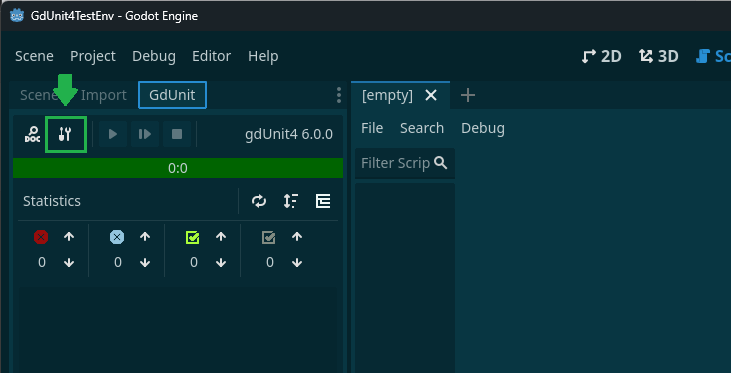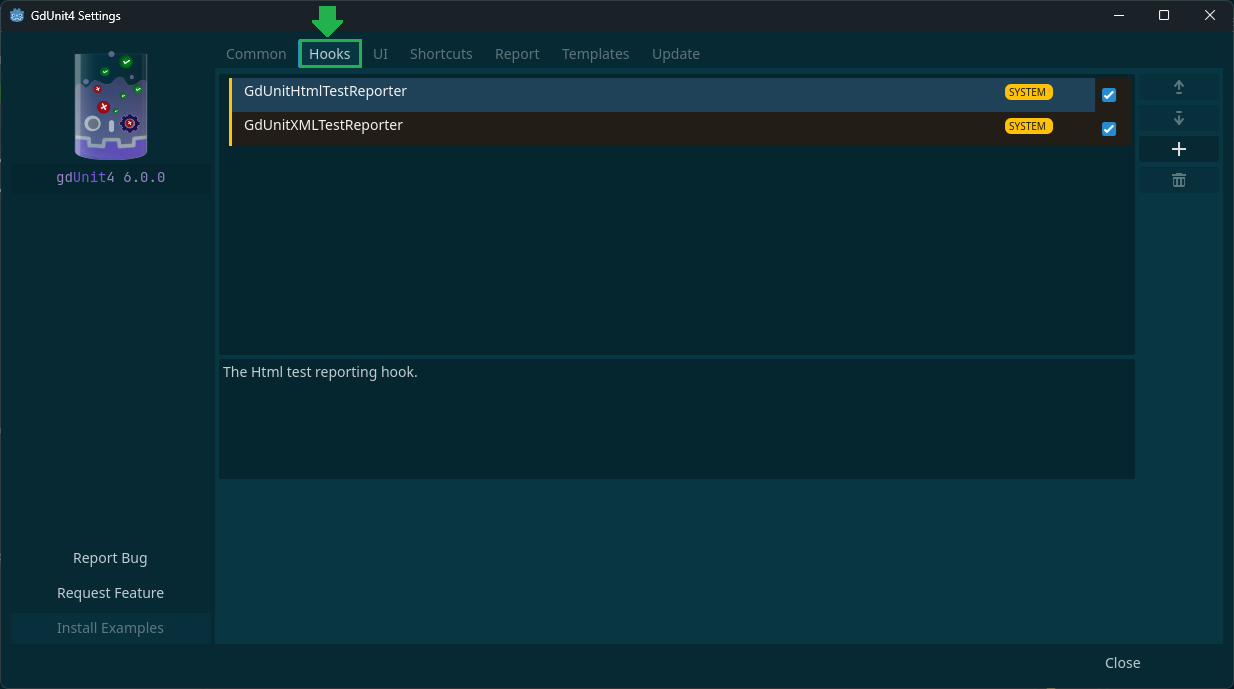Testing with Hooks
Test hooks provide powerful extension points in GdUnit4 that allow you to execute custom logic at specific moments during the test lifecycle. They enable sophisticated test environment management, custom reporting, and integration with external systems.
What are Test Hooks?
Test hooks are classes that extend GdUnitTestSessionHook and implement methods that run at the beginning and end of test sessions. Unlike test fixtures (before and after methods) that run for individual tests, hooks operate at the session level, making them ideal for:
- Setting up and tearing down shared test environments
- Managing database connections or external services
- Generating custom test reports
- Implementing test metrics and monitoring
- Integrating with CI/CD pipelines
Hook Lifecycle
Understanding when hooks execute is crucial for proper implementation:
GdUnitTestSessionHook API
Every custom hook must extend GdUnitTestSessionHook and implement two key methods:
-
class_name MyCustomHook extends GdUnitTestSessionHook func _init(): super("MyCustomHook", "Description of what this hook does") func startup(session: GdUnitTestSession) -> GdUnitResult: # Initialize resources before tests run ... # Send status messages through GdUnit messaging system session.send_message("Custom hook initialized") # Return success or error return GdUnitResult.success() func shutdown(session: GdUnitTestSession) -> GdUnitResult: # Clean up resources after tests complete ... # Send cleanup status session.send_message("Custom hook cleanup completed") return GdUnitResult.success() -
 Advice The GdUnitTestSessionHook is current not implemented and will be released with gdUnit4.api v5.1.0
Advice The GdUnitTestSessionHook is current not implemented and will be released with gdUnit4.api v5.1.0using GdUnit4; using Godot; public class MyCustomHook : GdUnitTestSessionHook { public MyCustomHook() : base("MyCustomHook", "Description of what this hook does") { } public override GdUnitResult Startup(GdUnitTestSession session) { // Initialize resources before tests run ... // Send status messages through GdUnit messaging system session.SendMessage("Custom hook initialized"); // Return success or error return GdUnitResult.Success(); } public override GdUnitResult Shutdown(GdUnitTestSession session) { // Clean up resources after tests complete ... // Send cleanup status session.SendMessage("Custom hook cleanup completed"); return GdUnitResult.Success(); } }
GdUnitTestSession API
The GdUnitTestSession object passed to your hooks provides several useful properties and methods:
Properties
| Property | Type | Description |
|---|---|---|
_test_cases | Array[GdUnitTestCase] | Collection of test cases to be executed (read-only) |
report_path | String | File system path where test reports will be generated |
Methods
| Method | Description |
|---|---|
send_message(message: String) | Sends a message through the GdUnit messaging system |
find_test_by_id(id: GdUnitGUID) | Finds a test case by its unique identifier |
Signals
| Signal | Description |
|---|---|
test_event(event: GdUnitEvent) | Emitted when test execution events occur |
Practical Examples
Example 1: Database Test Hook
This example shows how to set up and tear down a test database for integration testing:
-
class_name DatabaseTestHook extends GdUnitTestSessionHook var db_connection func _init(): super("DatabaseTestHook", "Manages test database lifecycle") func startup(session: GdUnitTestSession) -> GdUnitResult: session.send_message("Creating test database: %s" % test_db_name) # Connect to database server db_connection = DatabaseManager.connect_to_server({ "host": "localhost", "port": 5432, "user": "test_user", "password": "test_password" }) if not db_connection: return GdUnitResult.error("Failed to connect to database server") # Create test database if not db_connection.create_database("test_db_name"): return GdUnitResult.error("Failed to create test database") session.send_message("Test database ready") return GdUnitResult.success() func shutdown(session: GdUnitTestSession) -> GdUnitResult: session.send_message("Cleaning up test database") if db_connection: # Drop test database db_connection.drop_database("test_db_name") db_connection.disconnect() session.send_message("Database cleanup completed") return GdUnitResult.success()
Example 2: Performance Monitoring Hook
This example tracks test execution performance and generates a report:
-
class_name PerformanceMonitorHook extends GdUnitTestSessionHook var start_time: int var test_metrics: Dictionary = {} var current_suite: String = "" func _init(): super("PerformanceMonitor", "Tracks test execution metrics") func startup(session: GdUnitTestSession) -> GdUnitResult: start_time = Time.get_ticks_msec() # Subscribe to test events session.test_event.connect(_on_test_event) session.send_message("Performance monitoring started for %d test cases" % session._test_cases.size()) return GdUnitResult.success() func shutdown(session: GdUnitTestSession) -> GdUnitResult: var total_time = Time.get_ticks_msec() - start_time # Generate performance report var report = _generate_report(total_time) # Save report in the same directory as test reports var report_dir = session.report_path.get_base_dir() var perf_report_path = report_dir.path_join("performance_metrics.json") var file = FileAccess.open(perf_report_path, FileAccess.WRITE) if file: file.store_string(JSON.stringify(report)) file.close() session.send_message("Performance report saved to: %s" % perf_report_path) return GdUnitResult.success() func _on_test_event(event: GdUnitEvent) -> void: match event.type: GdUnitEvent.TESTSUITE_BEFORE: current_suite = event.suite_name test_metrics[current_suite] = { "start_time": Time.get_ticks_msec(), "tests": {} } GdUnitEvent.TESTCASE_AFTER: if current_suite in test_metrics: test_metrics[current_suite]["tests"][event.test_name] = { "duration": event.elapsed_time, "status": "passed" if event.is_success else "failed" } func _generate_report(total_time: int) -> Dictionary: return { "total_duration_ms": total_time, "suites": test_metrics, "timestamp": Time.get_datetime_string_from_system() }
Registering Hooks
To use your custom hooks, you need to register them in the GdUnit4 settings:
- Open the GdUnit4 Settings (Tools button in the GdUnit Inspector)

- Navigate to the Hooks tab

- Click the + (Add) button
- Select your hook class file
- Enable the hook using the checkbox
- Adjust priority if needed using the arrow buttons
Best Practices
Error Handling
Always return appropriate GdUnitResult values to indicate success or failure:
func startup(session: GdUnitTestSession) -> GdUnitResult:
if not initialize_resources():
return GdUnitResult.error("Failed to initialize resources: %s" % get_last_error())
if not validate_configuration():
return GdUnitResult.error("Invalid configuration: missing required settings")
session.send_message("All systems initialized successfully")
return GdUnitResult.success()
Resource Management
Ensure proper cleanup in the shutdown method, even if startup failed:
func shutdown(session: GdUnitTestSession) -> GdUnitResult:
var errors = []
# Always attempt cleanup, regardless of startup success
if resource_a:
if not resource_a.cleanup():
errors.append("Failed to cleanup resource_a")
resource_a = null
if errors.is_empty():
return GdUnitResult.success()
else:
return GdUnitResult.error(", ".join(errors))
Session Communication
Use the session object effectively for communication and event handling:
func startup(session: GdUnitTestSession) -> GdUnitResult:
# Send informational messages
session.send_message("Initializing test environment...")
# Access test configuration
var test_count = session._test_cases.size()
session.send_message("Preparing to run %d test cases" % test_count)
# Use report path for output files
var report_dir = session.report_path.get_base_dir()
session.send_message("Reports will be saved to: %s" % report_dir)
# Subscribe to test events
session.test_event.connect(_on_test_event)
return GdUnitResult.success()
func _on_test_event(event: GdUnitEvent) -> void:
# React to different event types
match event.type:
GdUnitEvent.INIT:
print("Test runner initialized")
GdUnitEvent.TESTSUITE_BEFORE:
print("Starting suite: %s" % event.suite_name)
GdUnitEvent.TESTCASE_BEFORE:
print("Starting test: %s" % event.test_name)
GdUnitEvent.TESTCASE_AFTER:
print("Finished test: %s (success: %s)" % [event.test_name, event.is_success])
GdUnitEvent.TESTSUITE_AFTER:
print("Finished suite: %s" % event.suite_name)
GdUnitEvent.STOP:
print("Test execution stopped")
System Hooks
GdUnit4 includes built-in system hooks that cannot be removed:
GdUnitHtmlTestReporter
Extends GdUnitBaseReporterTestSessionHook to generate interactive HTML test reports with:
- Detailed test results and execution times
- Collapsible sections for easy navigation
- Visual charts and statistics
- Failure details with stack traces
GdUnitXMLTestReporter
Extends GdUnitBaseReporterTestSessionHook to generate JUnit-compatible XML reports for:
- CI/CD pipeline integration
- Test result aggregation tools
- Automated build systems
Troubleshooting
Common Issues
| Issue | Solution |
|---|---|
| Hook not executing | Ensure the hook is enabled in settings and the class extends GdUnitTestSessionHook |
| Startup failures | Check console output for error messages; startup must return GdUnitResult.success() |
| Cleanup not running | Shutdown always runs; check for errors in your shutdown implementation |
| Priority conflicts | Adjust hook order in settings; hooks execute top-to-bottom |
| Missing test events | Ensure you’re connected to session.test_event signal |
| Report path issues | Use session.report_path.get_base_dir() to get the directory |
Debug Tips
- Use
session.send_message()for logging hook activities - Check the Godot console for detailed error messages
- Test hooks in isolation before combining multiple hooks
- Start with simple implementations and gradually add complexity
- Use
print()statements during development, but prefersession.send_message()for production
See Also
- Settings - Hooks Configuration - Configure and manage hooks in the GdUnit4 settings
- Test Setup/Teardown - Learn about test-level fixtures
